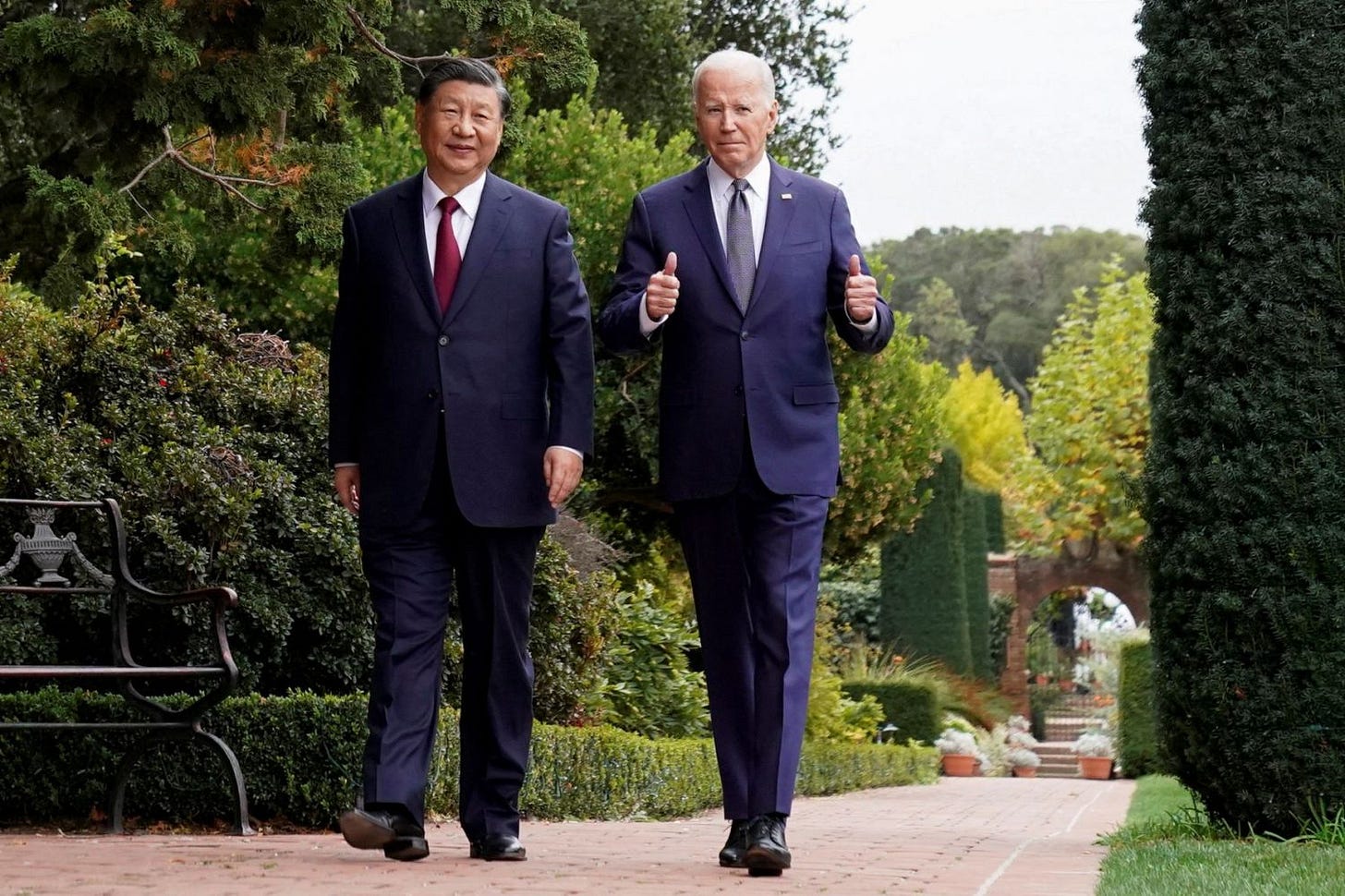The China-US-Taiwan dance continues
Biden and Xi may have eased some tensions in California, but Taiwanese politics could throw some logs on the fire.
As you probably know, earlier this month Biden met with Chinese President Xi Jinping near San Francisco for the first time in a year, and in just the second instance as world leaders (November 2022 at the G20 in Bali).

Going in to this meeting, the expectations for any sort of grand rapprochement were low. And this was intentional. As one analysis noted at the Council of Foreign Relations, “the low expectations…is a stark reminder that the world’s two largest economies disagree on nearly all of the most consequential issues.” Whether it be conflicts like Ukraine and Gaza, economic relations through industrial policy, decoupling and technology, or Taiwan, some of the most consequential geopolitical issues today pit the US against China. By setting low expectations and agreeing on a few matters during the session, Biden and Xi were able to play the meeting as a win while giving lip service to some of their key differences.
At least the parties agree that more needs to be done on climate policy.
What did Biden and Xi accomplish?
Reopening military communication channels
Military communication chanels between the two superpowers were discontinued last year after Nancy Pelosi visited Taiwan. China chose to interpret this visit as an escalation of tensions, and closed the chanels. As Wang Yi, China’s foreign minister, noted at the time, “the basic facts are that the United States first provoked China on the Taiwan question and blatantly violated China's sovereignty and territorial integrity.”
Getting military communication channels back and up and running is critical to avoid misinterpratations and mistakes. And when you are dealing with two nuclear powers who have not been on great terms recently, you don’t really want one accident to mean impending doom. Especially as the US has stepped up support for Taiwan and China has expanded its military maneuvers in the region.
It should be noted that China typically uses these channels as leverage. When Beijing is not happy with the US/China relationship, it stops defense communications. So to Beijing, this is more of a concession than any real improvement in relations. As Isaac Kardon of the Carnegie Endowment for International Peace notes, the US and China have fundamentally different understandings in the region, that preclude any sort of real progress.
Even if the People’s Liberation Army picks up the phone in a crisis—a heroic assumption, given past practice—the strategic interests (and corresponding military postures) of each nation present a structural dilemma that words will not easily overcome. Washington remains committed to free navigation in the region and a long-term policy to “fly, sail, and operate wherever international law allows.” Beijing claims that nearly all of the sea and air space along its periphery is under its jurisdiction, ambiguously fenced off from what “international law allows.”
Fentanyl
Many of the chemicals used by the Mexican drug cartels that ends up in the US flows from China. With fentanly responsible for over 70,000 deaths last year in the US, it was incumbent upon Biden to get Xi to do something to help stem the tide.
Previously, the CCP targeted companies manufacturing and exporting fentanyl in China. The companies reacted by selling the raw materials to the Mexican cartels. It is an industry that can be highly profitable for the cartels. One estimate is that a kilogram of chemicals from China costs $800. This kilogram of chemicals is enough to manufacture over 400,000 pills. These pills can be sold wholesale for as little as 50 cents to dealers, who then sell them for $3/pill.
After Pelosi’s visit last year, Beijing stopped cooperating on counternarcotics with the US, another demonstration of leverage on Xi’s part. In the days before the conference, the parties announced a deal where China would step up domestic measures on suspected chemical-exporters. The US and China will also set up a counter-narcotics group to crackdown on the epidemic.
With regional governments responsible for much of the administrative work, Biden stressed the need to verify that China would follow through on its commitment to fighting fentanyl. But if the economics of fentanyl remain strong and the demand is there, the criminal elements will likely find a way to circumvent the government’s measures. And considering China’s previous response to requests for cooperation in 2019, whether or not this succeeds is very much up in the air.
Business meeting
It is sort of interesting that Xi and Biden did not have dinner together. Instead, Xi went to a dinner with business titans like Apple’s Tim Cook and Elon Musk. In a speech to the assembled business community, Xi made sure to emphasis that China’s economy was back open for business.
“China is both a super-large economy and a super-large market…modernization for 1.4bn Chinese is a huge opportunity that China provides to the world.”
This is a clear demonstration from Xi that this trip was as much about courting foreign investment to help get China’s struggling economy back up and running, as it was meeting with Biden.
China has been sending negative signals to the business community for a while now, banning government employees from using iPhones, raiding the corporate offices of US firms like Bain and Mintz and engaging in a trade war over rare earth minerals.1 Business likes certainty and consistency. So Xi can speak in these platitudes, but it will probably be a while, if ever, before the private sector is comfortable enough to fully recommit to China.
6,000 miles away…
Keep reading with a 7-day free trial
Subscribe to Nuance Matters to keep reading this post and get 7 days of free access to the full post archives.



